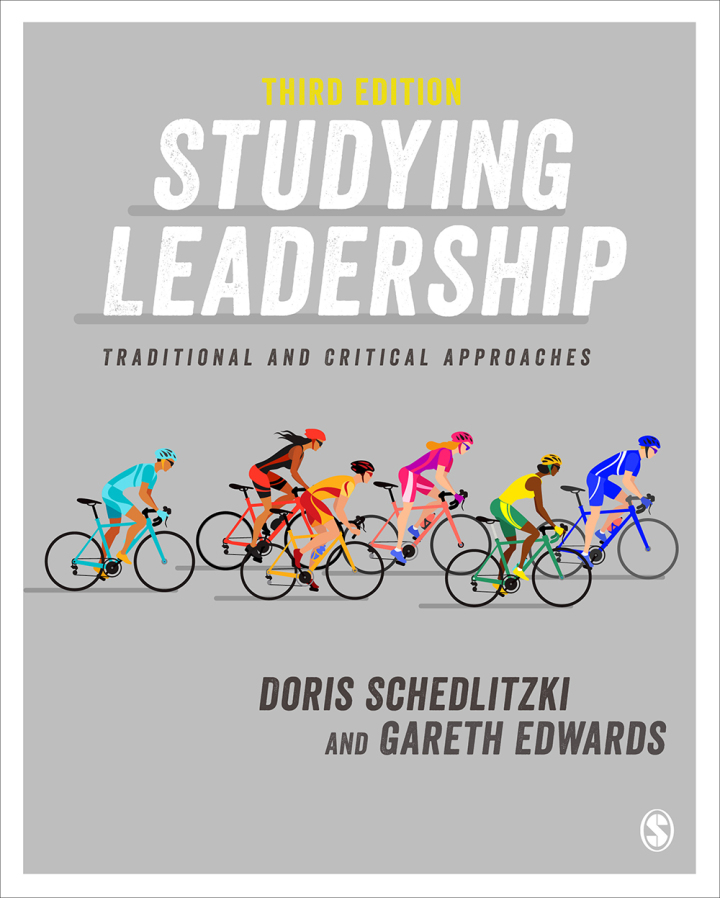
Studying Leadership 3rd Edition - Traditional and Critical Approaches
PUBLISHER: Sage
Trường ĐH, Nhóm, Thư Viện: Gọi 0915920514 để báo giá eBook hosting trên Vital Source hoặc mua Sách In
Học lãnh đạoPhương pháp tiếp cận truyền thống và quan trọngCuốn sách này là hướng dẫn toàn diện cho bạn về các lý thuyết, chủ đề và xu hướng lãnh đạo quan trọng. Nó vượt xa những điều cơ bản để khám phá các vấn đề đương đại như quyền lực và chính trị, tính xác thực, sự theo dõi, độc tính, ngôn ngữ, bản sắc, đạo đức và tính bền vững, cho phép bạn có được sự hiểu biết sâu sắc, toàn diện về lĩnh vực này. Được cập nhật xuyên suốt với các ví dụ mới, hộp Tư duy phản biện và các gợi ý đọc thêm, ấn bản thứ ba của Nghiên cứu về Lãnh đạo: Phương pháp tiếp cận truyền thống và phản biện là tài liệu bổ trợ lý tưởng cho các khóa học lãnh đạo trên nhiều lĩnh vực chủ đề, bao gồm Kinh doanh & Quản lý, Sức khỏe và Giáo dục. Giảng viên có thể truy cập nhiều tài nguyên hữu ích, bao gồm sổ tay hướng dẫn dành cho người hướng dẫn, các video và Tình huống kinh doanh SAGE chọn lọc, trang trình bày PowerPoint và ngân hàng bài kiểm tra, thông qua trang web đồng hành. Doris Schedlitzki là Giáo sư về Lãnh đạo Tổ chức tại Trường Kinh doanh và Luật Guildhall, Đại học London Metropolitan. Gareth Edwards là Giáo sư về Lãnh đạo và Nghiên cứu Cộng đồng tại Trường Kinh doanh Bristol, Đại học miền Tây nước Anh.
List of TablesList of FiguresAcknowledgementsAbout the AuthorsGuided TourOnline ResourcesPraise for previous editions of Studying LeadershipIntroduction: Mapping Different Approaches to Studying LeadershipThe Changing Landscape of Leadership Studies – Time, Focus and GeographyKey Philosophical and Methodological Debates – Psychological and Sociological PerspectivesOverview of the BookAdditional FeaturesPart I Traditional Approaches to Leadership1 Leadership and ManagementChapter AimsLeadership and Management: Are They the Same?Foundations of Fragmented TheoryThe Denigration of ManagementBoth Leadership and Management Are Needed in OrganisationsLeadership, Management and ChangeLeadership, Management and PowerSummaryAdditional Reflection QuestionsCase Study QuestionsFurther Reading2 Leadership Competencies: Traits, Personality, Skills, Styles and IntelligencesChapter AimsWhat Are Traits, Skills, Styles and Intelligences? What Is Personality?Traits, Characteristics and LeadershipPersonality and LeadershipLeadership StylesLeadership Styles across Hierarchical LevelsSkills Approaches to LeadershipIntelligences of LeadershipSummaryAdditional Reflection QuestionsCase Study QuestionsFurther Reading3 Contingency and Leader–Member Exchange (LMX) Theories of LeadershipChapter AimsGeneral Characteristics of Early Contingency Theories of LeadershipSituational Leadership TheoryLeast-Preferred Co-worker (LPC) Contingency TheoryPath-Goal TheoryOther Contingency TheoriesCritical Evaluation of Early Contingency TheoriesLeader–Member Exchange (LMX) TheoryCritical Evaluation of LMX TheoriesSummaryAdditional Reflection QuestionsCase Study QuestionsFurther Reading4 Charismatic and Transformational LeadershipChapter AimsCharismatic LeadershipCharismatic, Pragmatic and Ideological LeadersThe Development of Transformational Leadership TheoryOther Perspectives on Transformational LeadershipThe Impact of Transformational LeadershipLimitations of Transformational LeadershipThe Future of the ‘New Approach’SummaryAdditional Reflection QuestionsCase Study QuestionsFurther ReadingPart II Current Issues in Leadership5 Perspectives on Leadership ContextChapter AimsA Psychological Perspective on Context – Implicit Leadership TheoryA Psychological Perspective on Context – Social Identity Theory and LeadershipA Sociological Perspective on Context – Social Construction and Critical ApproachesSummaryAdditional Reflection QuestionsCase Study QuestionsFurther Reading6 Followership, Psychoanalytic and Relational Approaches to LeadershipChapter AimsFollower-centric Approaches to LeadershipThe Study of FollowershipCritical Perspectives and Future Trends in Follower-centric Approaches to Leadership and the Study of FollowershipPsychoanalytic Approaches to LeadershipRelational Approaches to LeadershipSummaryAdditional Reflection QuestionsCase Study QuestionsFurther Reading7 Leadership and PowerChapter AimsWhy Power?Power – A Focus on IndividualsPower – A Focus on Politics and RelationsA Critical Analysis of Mainstream Leadership Studies in Relation to PowerSummaryAdditional Reflection QuestionsCase Study QuestionsFurther Reading8 Strategic Leadership and Leading ChangeChapter AimsStrategic LeadershipCriticism of Strategic Leadership ApproachesLeading ChangeSummaryAdditional Reflection QuestionsCase Study QuestionsFurther Reading9 Distributed LeadershipChapter AimsWhat Is Distributed Leadership?Theories and Frameworks of Distributed LeadershipDistributed Leadership, Culture and CommunityLeadership as Social ProcessThe Leaderful MomentSummaryAdditional Reflection QuestionsCase Study QuestionsFurther Reading10 Leadership and CultureChapter AimsWhat Is Culture and Why Is It Relevant for Leadership?Organisational Culture and LeadershipApproaches to Studying Regional/National Culture and LeadershipThe GLOBE ProjectCritical Evaluation of the GLOBE ProjectThe Worldliness PerspectiveSummaryAdditional Reflection QuestionsCase Study QuestionsFurther Reading11 Leadership Learning and DevelopmentChapter AimsThe Development of Leadership LearningIntrapersonal Issues in Leadership DevelopmentInterpersonal Issues in Leadership DevelopmentProcess Issues in Leadership DevelopmentLongitudinal Perspectives on Leadership DevelopmentLeadership Development EvaluationCreative Approaches to Leadership Learning and DevelopmentCritical Approaches to Leadership Learning and DevelopmentThe Future of Leadership Learning and DevelopmentSummaryAdditional Reflection QuestionsCase Study QuestionsFurther ReadingPart III Critical Issues in Leadership12 Leadership, Gender and DiversityChapter AimsWhy Gender MattersMale Leaders or Female Leaders? What Is the Difference?Female Leaders and Feminine Leadership – Opportunities and Persistent ChallengesDiversity and LeadershipSummaryAdditional Reflection QuestionsCase Study QuestionsFurther Reading13 Leadership, Ethics and ToxicityChapter AimsWhat Is Leadership For?Ethical LeadershipToxic, Bad and Destructive LeadershipCritical PerspectivesEthics, Leadership and CommunitySummaryAdditional Reflection QuestionsCase Study QuestionsFurther Reading14 Leadership, Language and IdentityChapter AimsLanguage – Why Is It Relevant?Leadership and DiscourseNational LanguageUnderstanding and Working with LanguageLeadership as an IdentitySummaryAdditional Reflection QuestionsCase Study QuestionsFurther Reading15 Leadership, Arts and AestheticsChapter AimsWhy Arts and Aesthetics in Leadership?Aesthetics and LeadershipArt and LeadershipSummaryAdditional Reflection QuestionsCase Study QuestionsFurther Reading16 Researching LeadershipChapter AimsIntroduction to Research TerminologyTraditional ApproachesCurrent ApproachesCritical ApproachesThe Future of Leadership StudiesSummaryAdditional Reflection QuestionsCase Study QuestionsFurther ReadingAppendix: Case StudiesCase Study 1: Space Engineering ServicesCase Study 2: Arabian KnightsCase Study 3: Procurement Transformation at Lowe Power CompanyCase Study 4: Leadership through Values and Integrity – The Brandon TrustCase Study 5: Organisation as Purpose – Leadership as Relationship and Values through Social EnterpriseCase Study 6: Leadership in Transforming Services in a Local AuthorityCase Study 7: DesignCo – A Small Company in TransitionCase Study 8: Leadership in LaosGlossaryReferencesIndex















